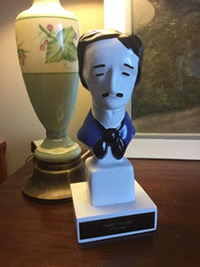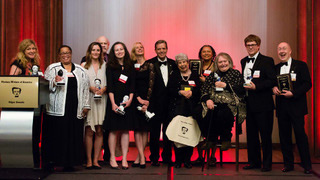![]()
 Ellen Hart – MWA Grand Master Speech Transcript
Ellen Hart – MWA Grand Master Speech Transcript
There are too many people, really, that I need to thank. Along the way I have been shown such kindness. I've always wondered, you know, when you ask a writer, "Who do you write for? Do you write for yourself? Do you write for your fans?" I remember Kurt Vonnegut was asked that question once and he talked about writing for an audience of one. And by that he meant his sister. For me, the audience that I've always written for and wanted to please more than anyone else was my partner. I've been with Kathy for 39 years. We got married three years ago? Three-four years ago? [laughs] I don't remember. She has been with me... reading my books, working with me on stories, allowing me to bore her to death with chapter by chapter by chapter. And over that period of time I think she's become one of my best editors. So, I want to thank Kathy.
I was in Chicago a few years ago—well... probably mid-90's. I'm old.—for the Lambda Literary Awards. And I was absolutely certain—I was nominated that year—and I was absolutely certain that Jean Redmond, who just introduced me, was going to win, so I convinced her to come up from New Orleans because I had read all the books and I thought hers was the best. And when they called my name, I was, I was embarrassed that I had prevailed upon her. And of course I was blown away. When I got up to accept the award, this disembodied voice came over the loud speaker and said, "Thank your mother." The woman who said it couldn't have known that my mother had just died a few months before. I'm sure I stumbled around, I'm not even sure if I actually did thank my mother, but that's what I want to talk about just for a few minutes.
My mother was an iconoclast. She didn't care what people thought of her. What was important to her was what she thought of them. She was deeply religious. She was the only person who knew the 'truth,' so she was a religion of one. She had very, very, very strong, very conservative beliefs. And I think like many parents, she wanted me to be a carbon copy of her, she wanted me to believe what she believed. She was always annoyed that I didn't. That I didn't have the same values that she had. She called me her "philosophical monster." She created in me this ability to stand up to her and say, "No, I don't believe that. No, I don't agree with you." And I think it always galled her that I was strong enough to do that. But one of the lessons she taught me, and I think it's one of the most important lessons that I ever learned in my life, was that ideas are important. Ideas rule the world. We disagreed on what those ideas were, but we agreed on that basic premise.
Kathy and I had been together almost 15 years when we came out to her. She wanted to know how long we'd been together. And I told her. And I was so scared that she wasn't ever going to want to see me again. When we told her, she said, "Oh, I know that." Later, after reading a few of my books, she commented, "You know, I can see why you write what you write. You are marching in your books."
The gay community, on the other hand, had always thought my books weren't gay enough. I've won a lot of awards, but I also know how I was viewed. I don't put sex in my books and if you know anything about gay publishing today, you pretty much have to have sex in your books or you're not really considered politically legit. I happen to think my credentials are pretty good, but the gay community didn't always agree. What I'm trying to say is, my mother thought I was marching in my books. The gay community thought I wasn't gay enough. I wasn't entirely pleasing anybody, but these were the books I wanted to write.
I was Chicago once for ABA. Long time ago, when there was still an ABA. And a woman got up in the audience—I was on a panel—and she said, "I just read your new book, and I really disagree with what you wrote." When I asked her why, she said, "Well, you have your main character go to a small town, and in that small town," she said, "If it was me, and I went to that small town, I'd want to know where the gay bar was. That'd be the first thing I'd ask. Or where the women's center was or where the feminist bookstore was." People in the audience nodded and seemed to agree—it was a partly gay audience—and I remember saying, "Well, you know, if I go to a small town in Wisconsin," which is where it was, "the first thing I would ask is, ‘Where are the good restaurants?'"
I had a bit of a different approach to some of this. And I think, because I tried very hard from the very first book to set my character within, not a ghetto, with only gay people, only lesbians, but in the larger world, and my main character, she is gay. It's part of who she is, but it is not the totality of who she is. Because I made some of these choices early on, I always felt like I was walking in between these two worlds, never quite pleasing anyone. In a way, I think the world has caught up with me, as come to understand what I was doing.
So, yes, I do want to thank my mother for some very important life lessons. Today, women seem to be crashing through the glass ceiling. Not always, not every day, not all the time. But we're making progress. Maybe not fast enough, but it's happening. Tonight, deeply, from my heart, I want to thank MWA for helping me crash through the lavender ceiling. This is a first—an out lesbian writer being named a Grand Master. I'm very aware of the historical nature of this night. My love to all of you writers in the audience for all of the hours of enjoyment you've given me. Thank you all for this honor.

Edgar Award
Winners
© Ellen Hart.


